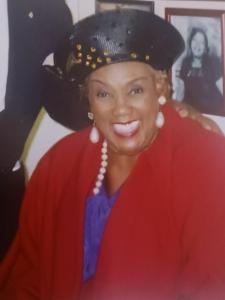By Reginald Williams,
Special to the AFRO,
and Alexis Taylor,
Managing Editor
“I take care of my own affairs,” proclaims Ruth F. McIlwaine.
As she prepares to celebrate her 100th birthday, the former Wings Over Jordan Choir (WOJC) member has a voice that is still rich, powerful, and buoyant. The future centenarian makes it known that she still handles her day-to-day business. She chooses what she wants to do– even if it’s just “sitting around and watching television.”
On Feb. 1, her age will officially require three digits.
McIlwaine shared that she will spend time with her family to celebrate turning 100 years old, but a big public gathering is out of the picture.
“My son and daughter will be over,” she said. “But I just don’t be going out during these times.”
U.S. News & World Report states data collected in 2020 reports America has more than 97,000 centenarians– an increase of 58 percent over the past 20 years.
McIlwaine rises between 10:30 a.m. and 11 a.m. each morning, but only because she is a night owl. Before the pandemic, McIlwaine shopped, attended social functions, and sang at Galbraith AME Zion Church, located on 6th Street, in Northwest Washington.
Born in Columbus, Ohio, McIlwaine moved to Washington, D.C., in 1951 when she married John A. McIlwaine. They remained married for 69 years before death did them part. She has two children, John Louis, who lives with her in the District, and her daughter Sharon R. Mason resides in Prince George’s County.
McIlwaine had four sisters and three brothers. Her parents were Mr. Lewis Fomby and Ms. Mary Fomby. Her mother was born in Alabama and her father was born in Georgia. Still to this day, she has one niece in Alabama and three nieces in Atlanta.
“During the Great Depression, my father took ill and we moved back to Alabama,” McIlwaine told the AFRO. “I was around seven years old at that time, so I really grew up in Alabama. I was 20 years old when I left and joined WOJC.”
When asked what life was like during her childhood in Alabama during the 1920s and 30s, McIlwaine replied “just what you read about it.”
“In the South at that time – the entire country, really- there was segregation. Blacks had theirs and White had theirs. You couldn’t go into stores, or you could go– but you were waited on last. If a White and Black person were standing at a counter to purchase something, they would wait on the White person first and the person of color last,” she said.
Still, McIlwaine says the African Americans of this time pressed forward. Free from the bonds of slavery, Black men and women of the South created a life for themselves– even in the face of Jim Crow.
“Back in that day, people of color had their own social life. They had their own entertainment and everything. That was back during the days of Count Basie and Duke Ellington. There was a huge recreational park in Anniston, Ala. for colored people only. All of the entertainers came and they had everything–all kinds of entertainment. They had pools, picnics and gazebos,” said McIlwaine. “The church was the backbone of everything for Black people at that time– for worship as well as social. I grew up at New Hope Baptist Church.”
As an entertainer herself, McIlwaine was afforded the opportunity to see how Black people lived all over the country.
McIlwaine, an alto, joined WOJC in 1947 and traveled extensively with the Cleveland-based spiritual choir for three years. The choir, credited with improving race relations, is endorsed as the first independently produced national and international radio programs created by African Americans. She even sang at the opening of the Kennedy Center in Washington, D.C.
“When I was with WOJC I traveled all over the United States more than once. I experienced everything as far as opportunities and things that people of color could do,” she told the AFRO. “People all over the country, back in that day, had their own areas– theaters, restaurants, whatever– they had their own.”
McIlwaine was careful to highlight that even though segregation kept them out of big hotels that wouldn’t accommodate them– even “up North,” there were Black entrepreneurs who stepped in the gap.
“One of the big Black hotels in New York City was the Theresa Hotel,” said McIlwaine. “It was a grand hotel. That’s where people of color would get lodging.”
According to the National Park Service, Hotel Theresa “was known as the ‘Waldorf of Harlem,’ playing host to many of America’s most prominent black social, political, entertainment, and sports figures, as well as to many foreign dignitaries.”
NPS reports that “in 1940, long after Harlem had become a predominantly African-American community, the Hotel Theresa dropped its discrimination policies, went under new management, installed an African-American manager and catered almost exclusively to a Black clientele. As a result, the Theresa went on to become the most famous African-American hotel in the nation.”
When it came to entertainment, the Black community certainly wasn’t lacking in any regard.
“The people of color had their own outlets and entertainment. They had their own theaters and nightclubs,” said McIlwaine. “The Howard Theatre was a great showcase for entertainment down through the years and that was for people of color.”
McIlwaine told the AFRO that she remembers the shift that came for Black entrepreneurs, once desegregation became law and Black people were no longer forced to patronize Black businesses.
“When things integrated, the great change came. Black people started going to the White places where they couldn’t have gone when segregation was prevalent and everywhere.”
For someone coming up on a century of life, McIlwaine’s memory is still pretty sharp. She credits her longevity to the “golden rule.”
“I’m a deep person of faith and I believe in fairness and doing the right things,” replied McIlwaine when asked how she has lived so long. “‘Do unto others as you would have them do unto you.’ That’s all I can say.”
Reginald Williams, the author of “A Marginalized Voice: Devalued, Dismissed, Disenfranchised & Demonized” writes on Black men and Holistic Health concerns. Please email bookreggie@reginaldwilliams.org or visit amvonlinestore.com for more information.
Help us Continue to tell OUR Story and join the AFRO family as a member –subscribers are now members! Join here!
The post District centenarian Ruth F. McIlwaine celebrates 100 years appeared first on AFRO American Newspapers .











